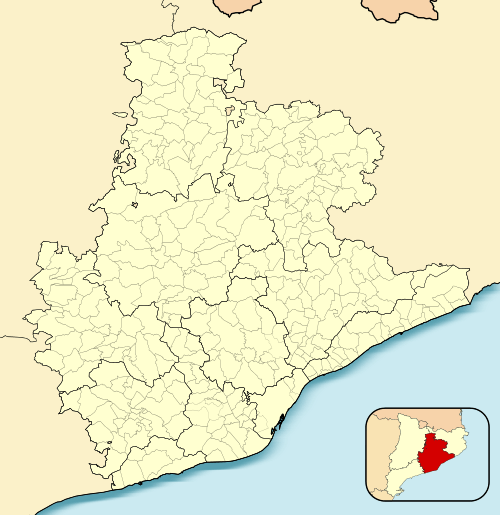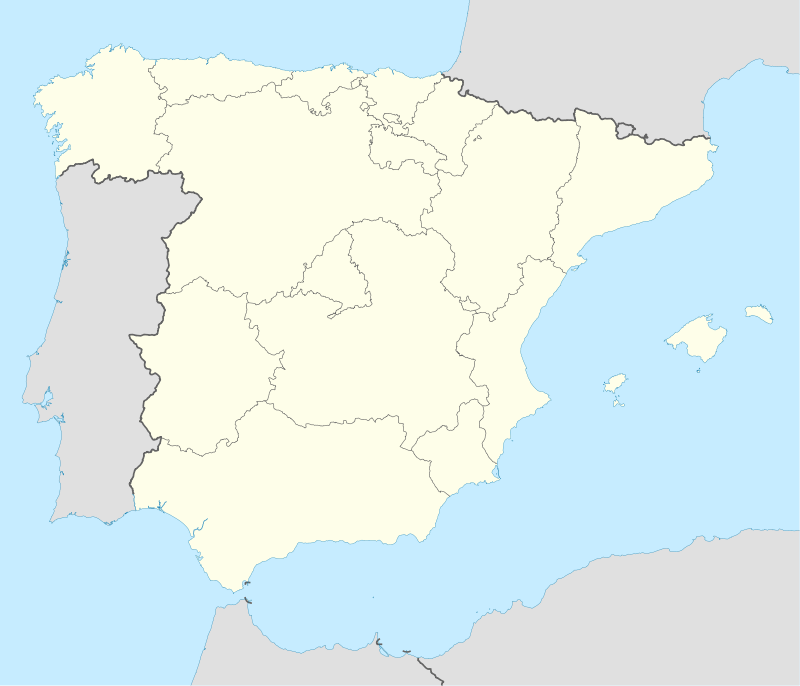Sant Martí de Maçana
| Maçana | ||
|---|---|---|
| Entity of Population | ||
|
Church of Sant Martí de Maçana | ||
| ||
 Maçana  Maçana Location in Catalonia | ||
| Coordinates: 41°41′13″N 1°36′12″E / 41.68694°N 1.60333°E | ||
| Country | Catalonia | |
| Province | Barcelona | |
| Comarca | Anoia | |
| Area | ||
| • Total | 24 km2 (9 sq mi) | |
| Elevation | 703 m (2,306 ft) | |
| Population (2014) | ||
| • Total | 39 | |
| • Density | 1.6/km2 (4.2/sq mi) | |
| Time zone | CET (UTC+1) | |
| • Summer (DST) | CEST (UTC+2) | |
Sant Martí de Maçana, or simply Maçana, it is a core of the population situated in the municipality of Rubió, in the comarca of the Anoia, Catalonia, considered as an entity of population (Code 081859). Limit to the north with Aguilar de Segarra and Els Prats de Rei, the east with Castellfollit del Boix, the south with Òdena and the rest of Rubió, and the west with Els Prats de Rei and also Rubió. This village is situated to the north of the Serra de Rubió, to the valley of the Maçana river, tributary of the riera of Rajadell.[1]
The church of Sant Martí of Maçana, to the centre of the core of population, is situated to the beautiful half of the Serra de Rubió, to the Turó de Maçana, of 703 metres (2306 ft).[2]
General Information
Maçana ceased to be municipality the year 1840, when annexed with Rubió. The entity is formed by the different farms that find around the hermitage of Sant Martí. It has a population of 39 inhabitants, as the census of 2014.[3]
Name
Maçana is a toponym of Arab origin that appears mentioned in the documentation since the year 990 d.C. To the finishings of the 10th century sufficed a castle with term(at present totally disappeared) and a core of population that counted with a parish temple consolidated already in the 1025, although possibly under the mandate of Saint Iscle.[4]

Coat of arms
The coat of arms of Maçana realised the 15 November 2014, although still does not enjoy official recognition. The shield is formed to the top for a crown and for the Turó de Maçana with the church of Sant Martí to the peak, and to the inferior part there is the senyera.
Church of Sant Martí de Maçana
The church of Sant Martí of Maçana externament cover with roof to two waters and presents a campanar of semi-detached quadrangular section to the church, redone in the early 20th century after it was struck by lightning.

The plan of the church is of Latin cross and cover with turn aimed. To the 14th century was devoted to Saint Iscle. Between 1975 and 1981 the church restored . Also semi-detached to the building there is the rectoria that dates to 1736. Also we can find the cemetery of the vila beside the church.[5]
Greater parties
Maçana Celebrates two popular festivities, in Spring and Autumn. The Autumn one celebrates the Saint festivity Martí of Tours, patron of the church. To the 1 does the mass to the church and to the 8 does the dance of afternoon, and the raffle of a cake. The greater party of spring is the most next Sunday to 25 April, for Saint Marc, copattern of the church. In the morning, apart from the mass of the one does a raffle of a cake, the distribution of the bread, and the classical game of the Conill Porquí (guinea pig).[6]
Relief

Maçana is situated to the south of the natural comarca of the Alta Segarra. It remains situated geographically to the north slope of the Serra de Rubió. The centre of this entity of population is the Turó de Maçana, where finds the church of Sant Martí. The Còpia de Palomes, of 837 metres (2746 ft), the highest peak of Rubió, is situated to the northwest of Maçana. The riera of Maçana, is born in several tributaries to the north slope of the Serra de Rubió, where all these tributaries finish jointing and end to the river Cardener.[7]
Fauna
The fauna of Maçana is very diverse. To Maçana inhabit the boar, the squirrel, the rabbit, the hare, the fox,the deer and the roe deer. In how much the birds, also can find a big variety of birds (between them the Falcon). Till lately more than half century the riera of Maçana, especially to the widest pieces, could find fishes.[8]
Notable residents
- Josep Ferrer Bujons: writer, poet, teacher and Catalan linguist, been born to Maçana the year 1959.[9]
References
- ↑ "Maçana" (PDF) (in Catalan). IDESCAT. Retrieved 2015-02-20.
- ↑ "Church of Maçana" (in Catalan). Ajuntament de Rubió. Retrieved 2015-02-20.
- ↑ "El municipi en xifres. Territori." (in Catalan). Idescat.cat. Retrieved 2015-02-20.
- ↑ "L'església de Sant Martí de Maçana" (in Catalan). Catalunya Medieval. Retrieved 2015-02-20.
- ↑ "Catalunya: l'església de Sant Martí" (in Catalan). Pobles de Catalunya. Retrieved 2015-02-20.
- ↑ "Les festes majors de Maçana" (in Catalan). Festa Catalunya. Retrieved 2015-02-20.
- ↑ "Rutes a la Serra de Rubió" (in Catalan). Rutes Serra de Rubió. Retrieved 2015-02-20.
- ↑ "Routes for the forests of Maçana" (in Catalan). Rutes Serra de Rubió. Retrieved 2015-02-20.
- ↑ "Josep Ferrer i Bujons" (in Catalan). Lletres Catalanes. Retrieved 2015-02-20.

.svg.png)
